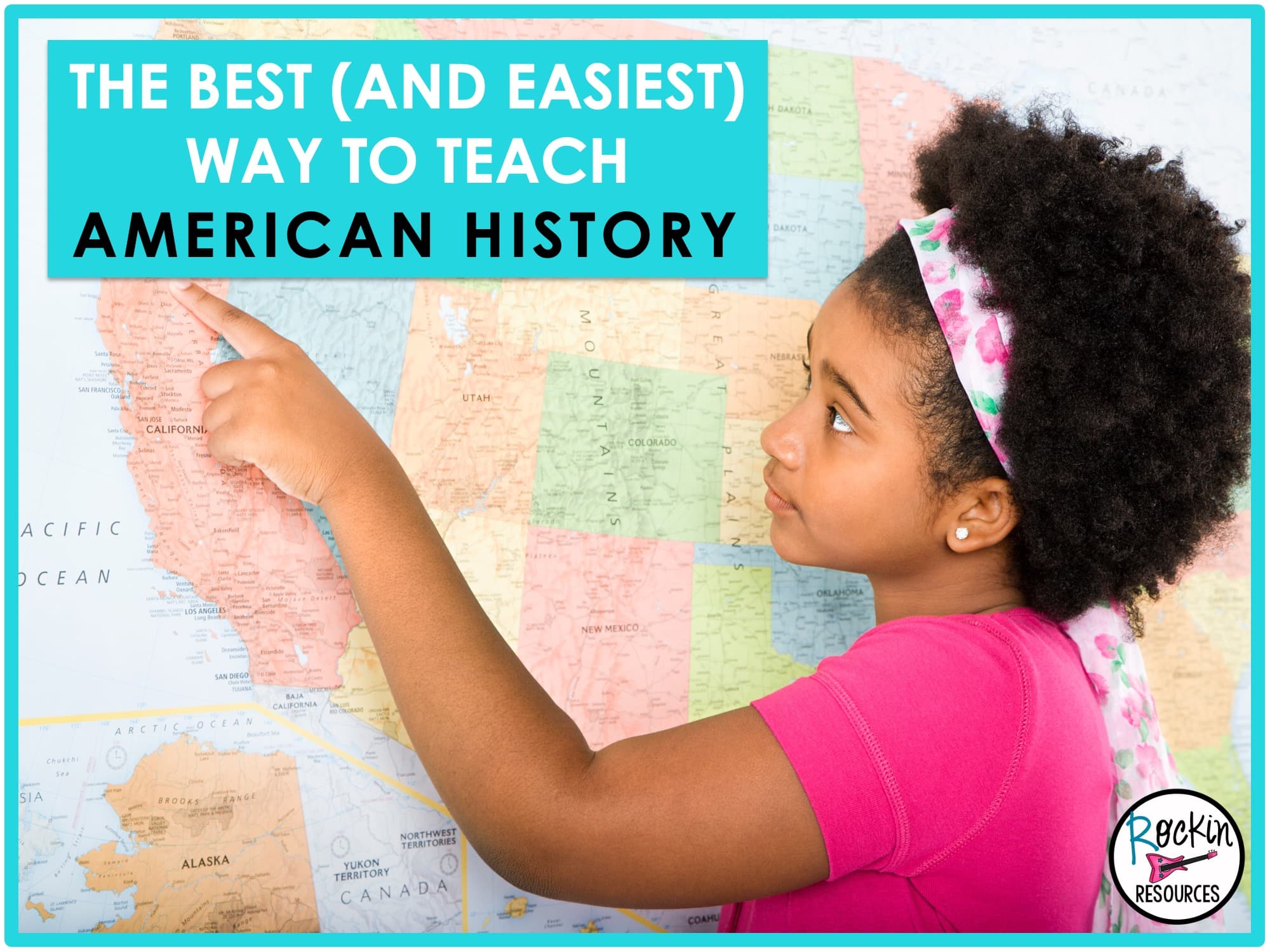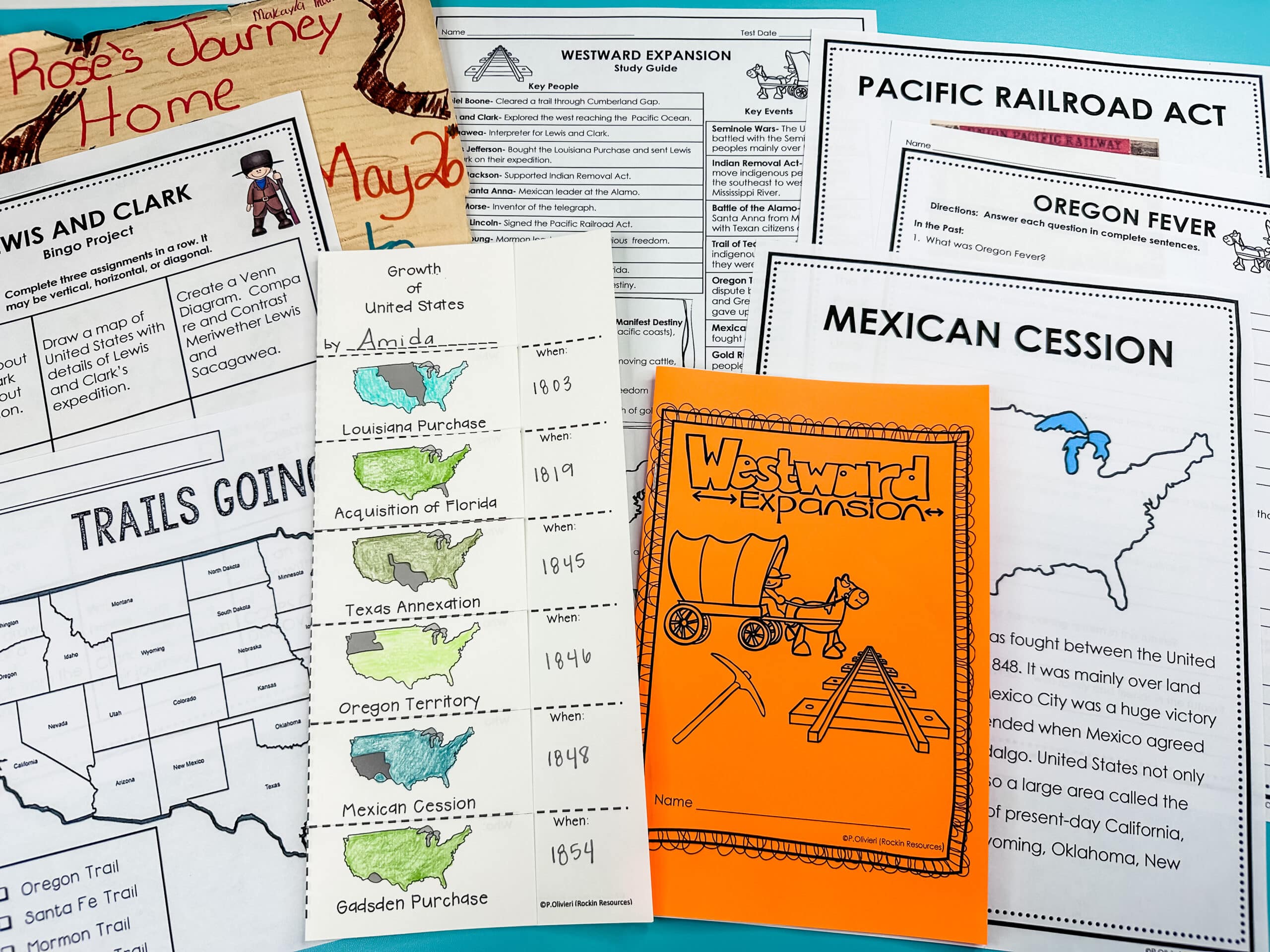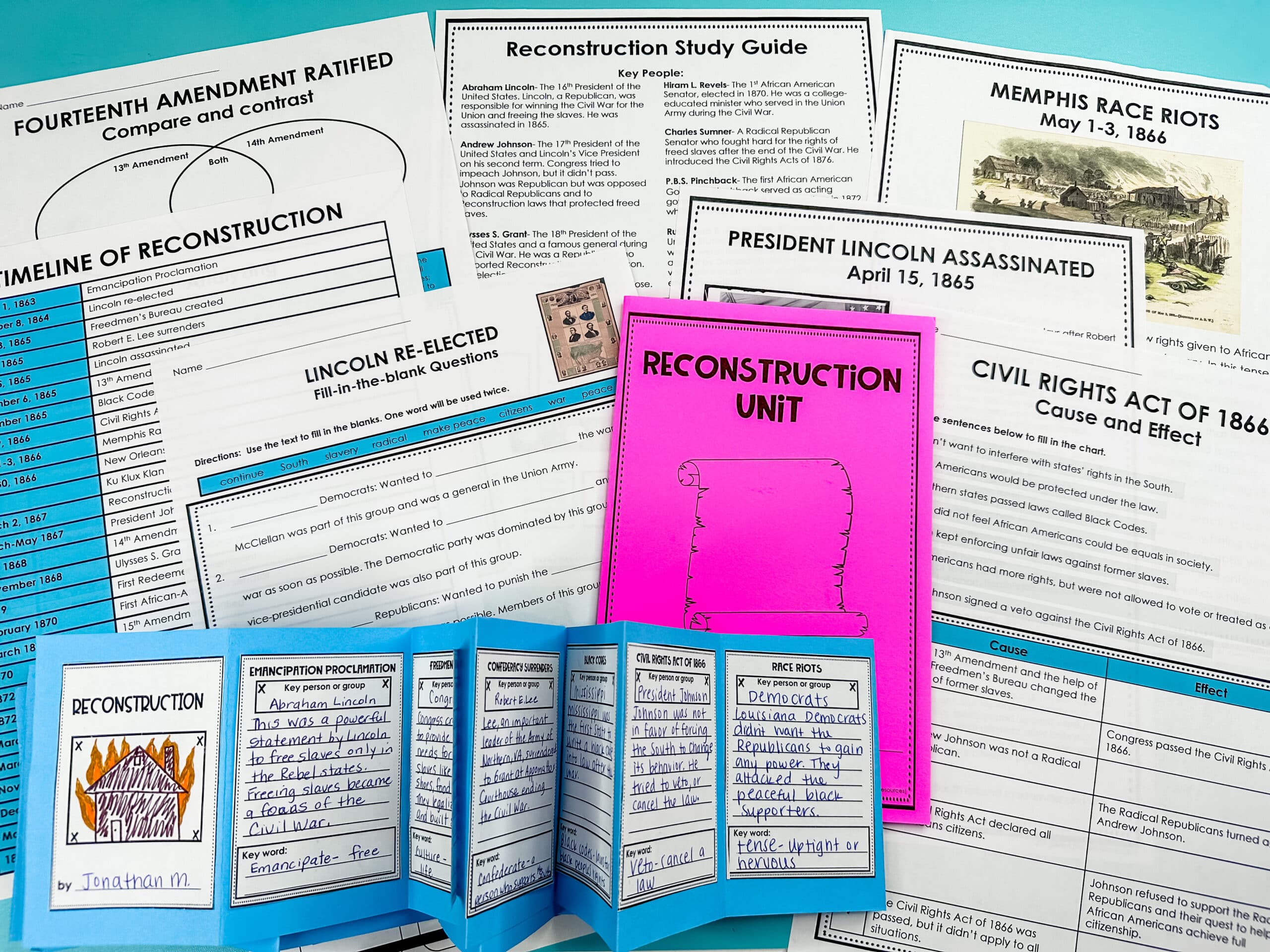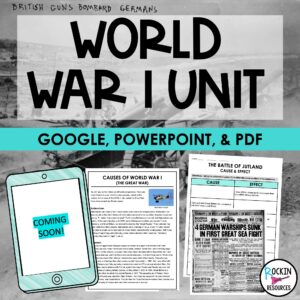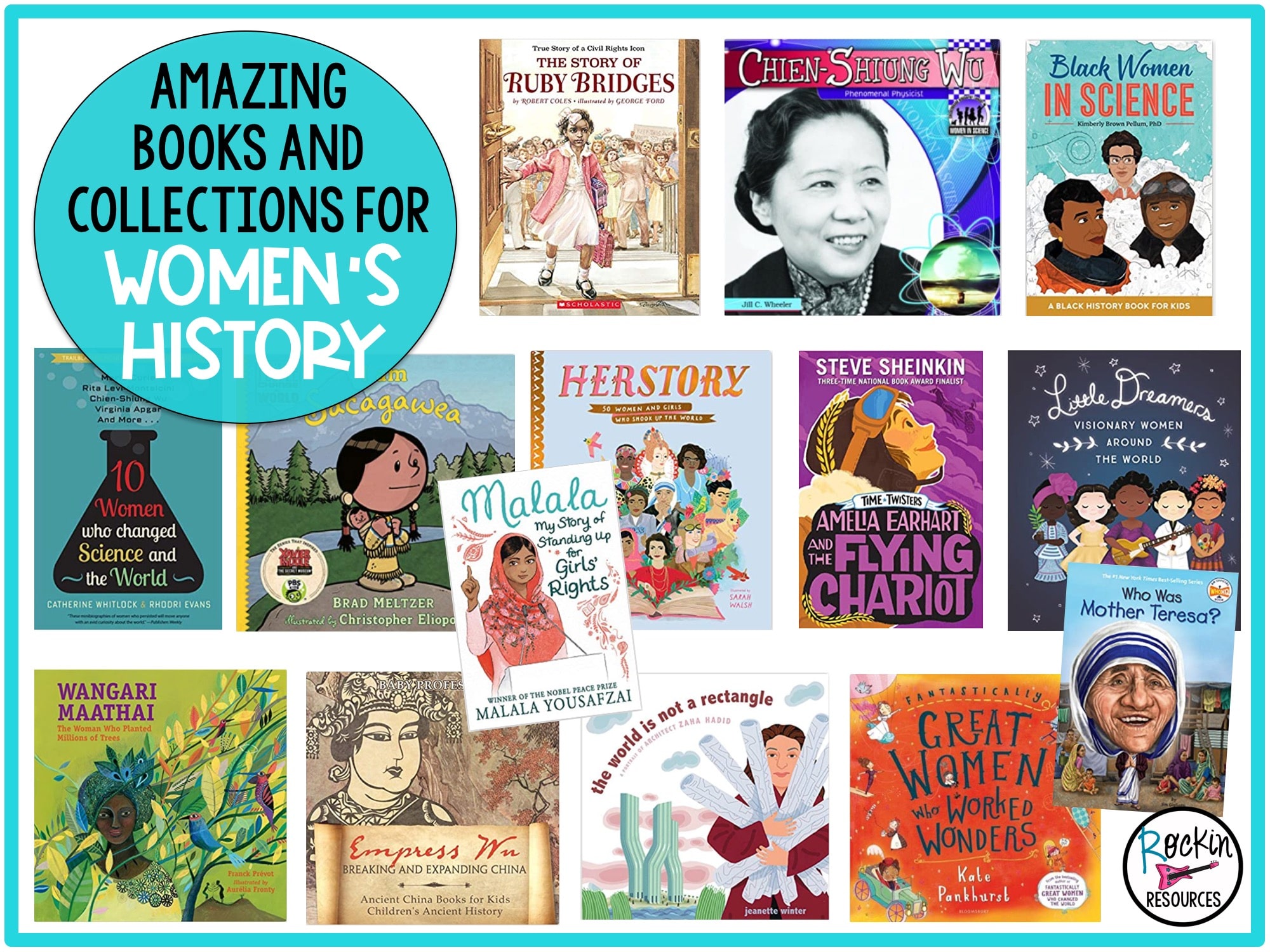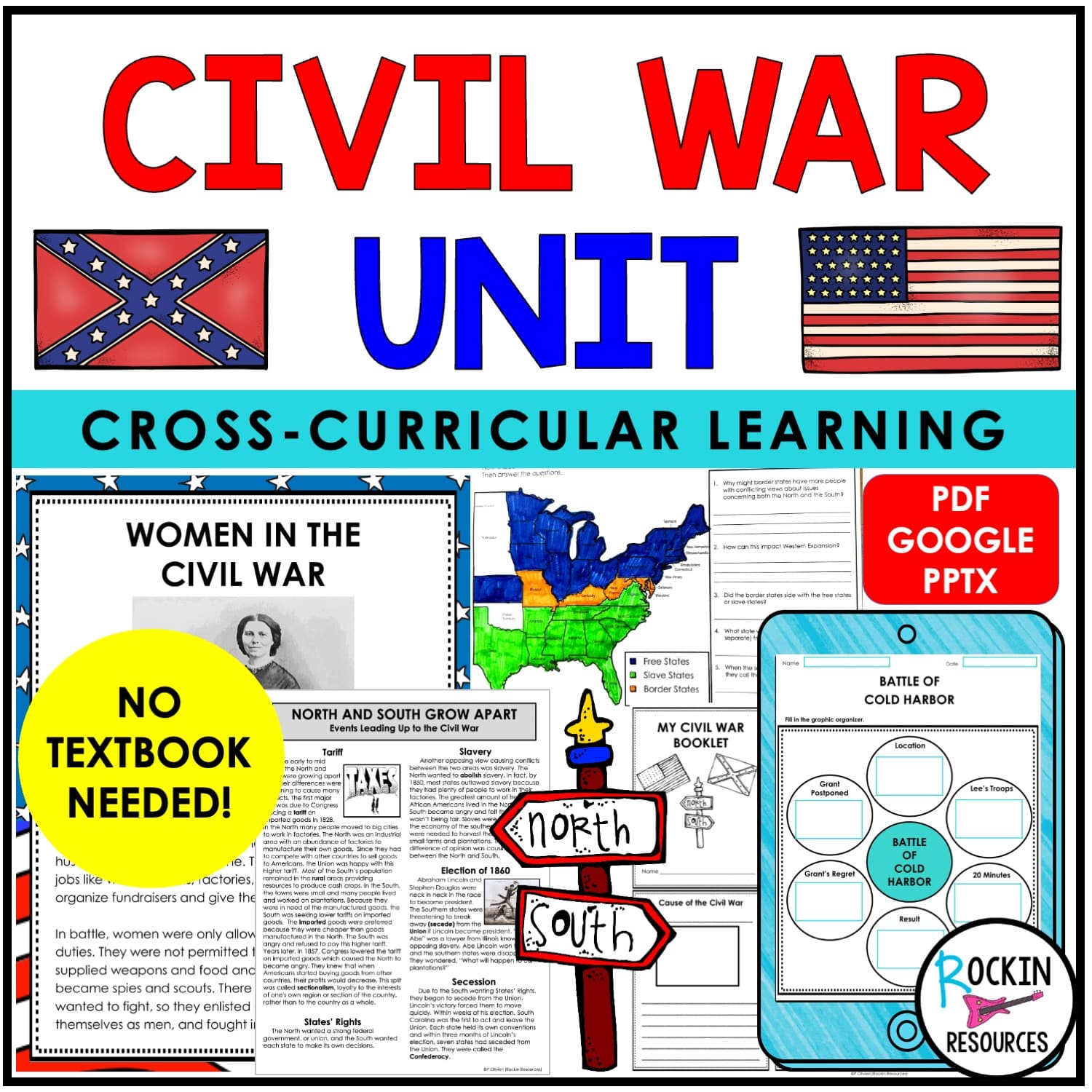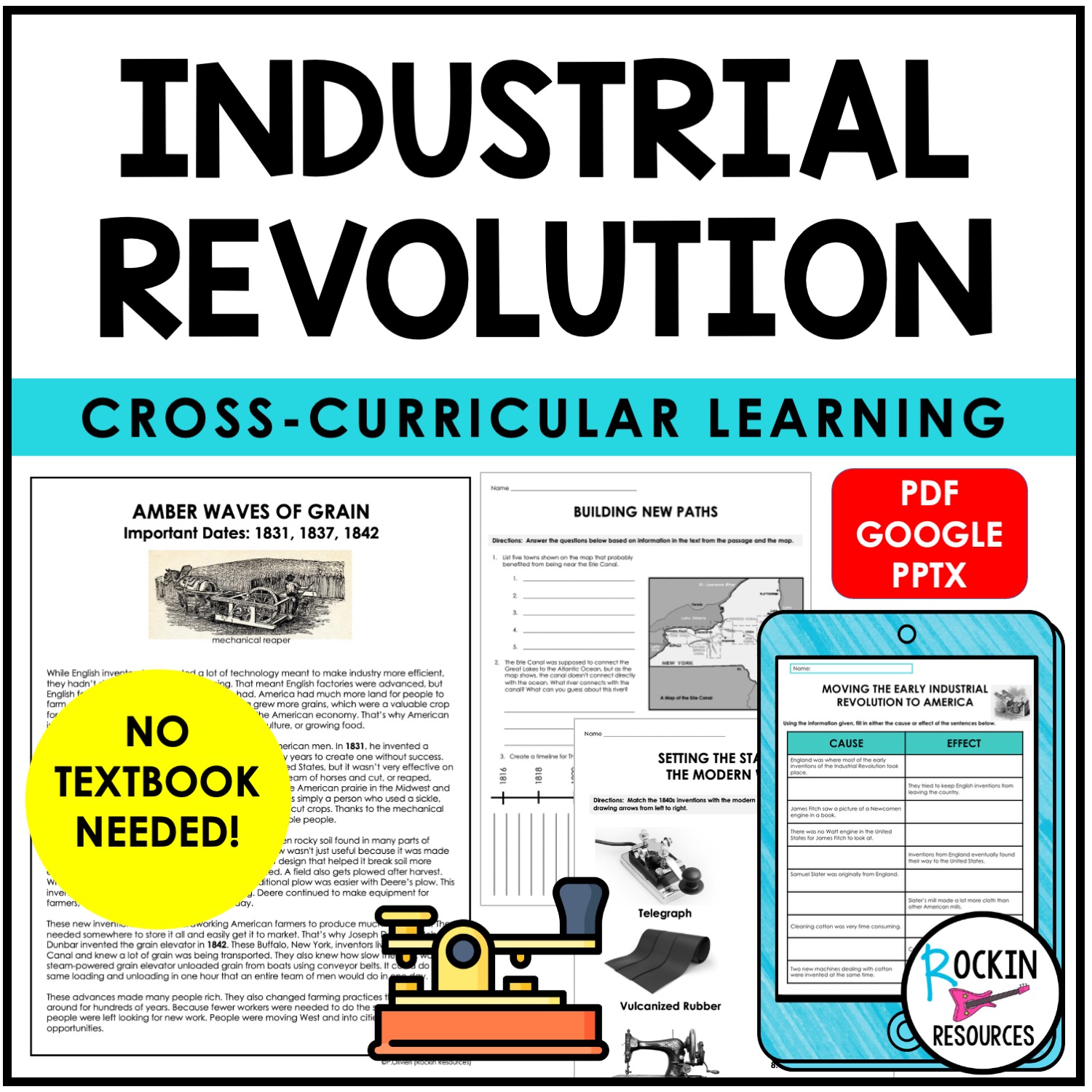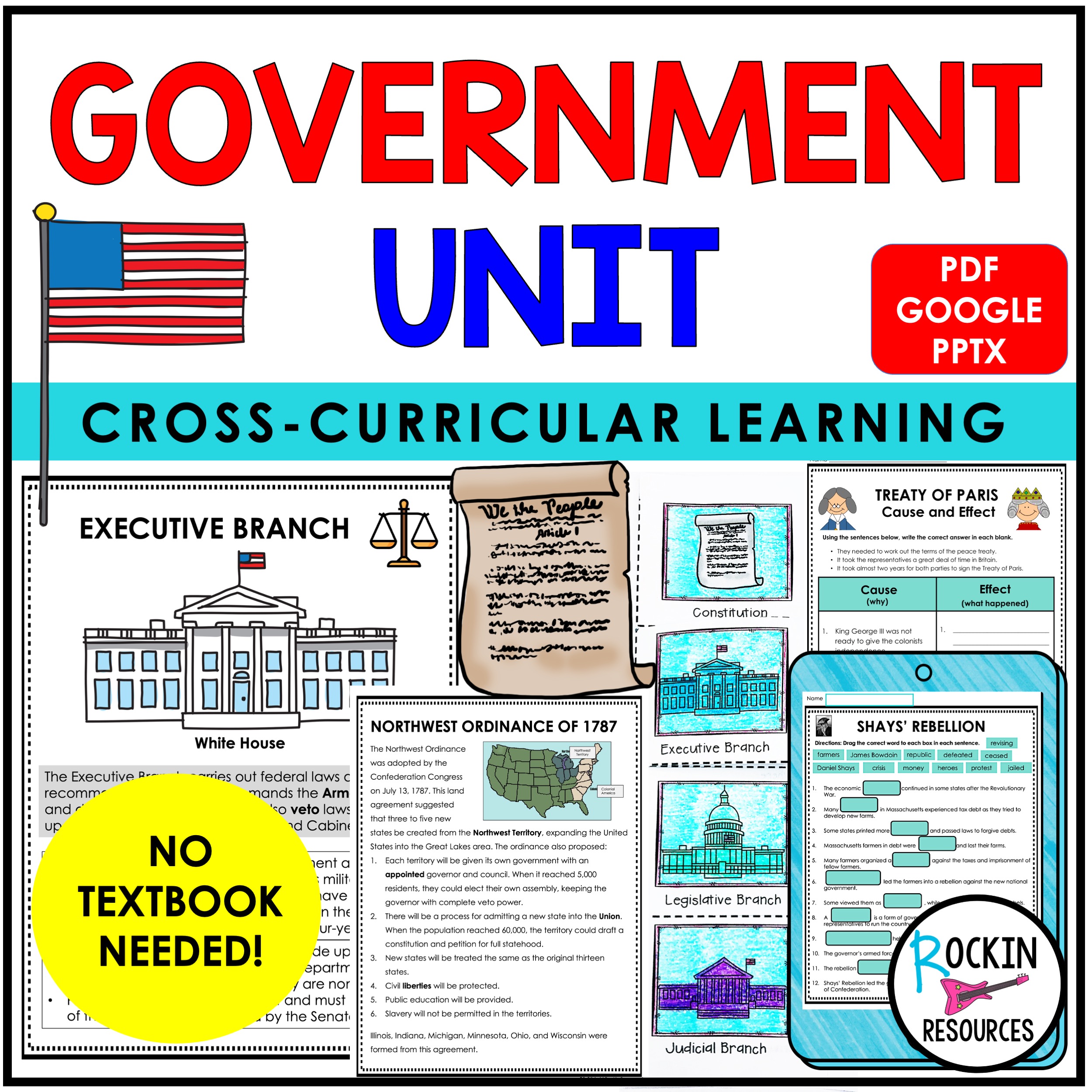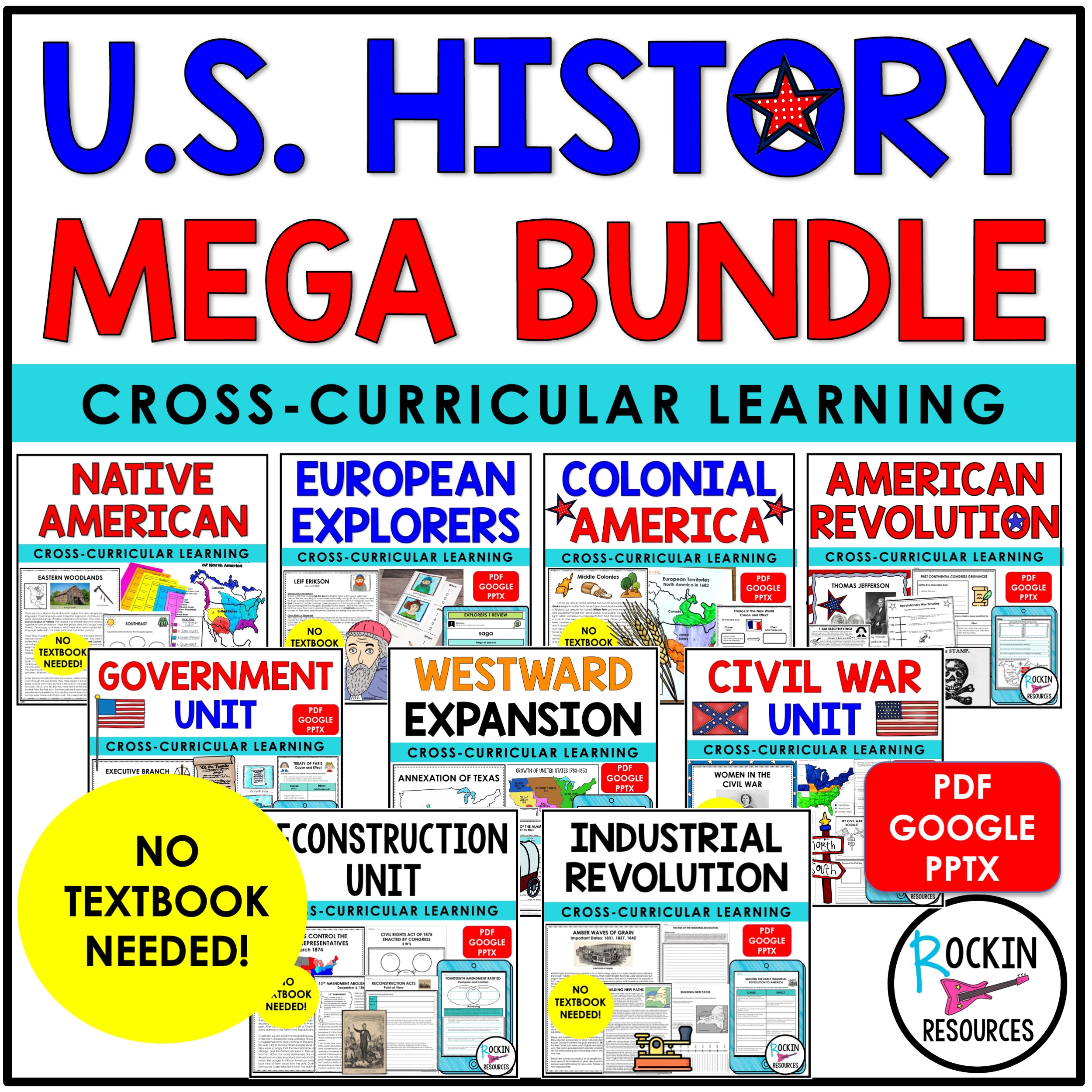WOW! A lot has happened in our American History! There’s so much to cover in each era! With such a large amount of content, it can be overwhelming and let’s be honest…boring! That is why I’m breaking down the best (and easiest) way to teach American History!
I’ve put together several comprehensive social studies units for you to make it easy for you and keep students’ interest. In these units, you will find informational text passages, comprehension activities, study guides, maps, charts, study guides, assessments, projects, mini text booklets, and so much more. The best part? No textbook needed! It is all there for you. A Google and PowerPoint version is also included with self-check study slides. Below, you will get a quick glimpse of what each unit offers, plus what other teachers are saying about them. Check it out!
NATIVE AMERICAN UNIT
Who were the first people to live on American soil? This Native American Unit gives you all the material you need to successfully educate your classroom on seven different Native American regions in North America! Students will get maps and charts to help them learn information about the climate, traditions, resources, homes, government, food, tools, weapons, arts, crafts, as well as how the indigenous people of that region live today. With each of the articles, students are given a variety of reading skills to show their comprehension of the articles. There are also acrostic poems and a quiz for each region, a cumulative quiz, and a cumulative project!
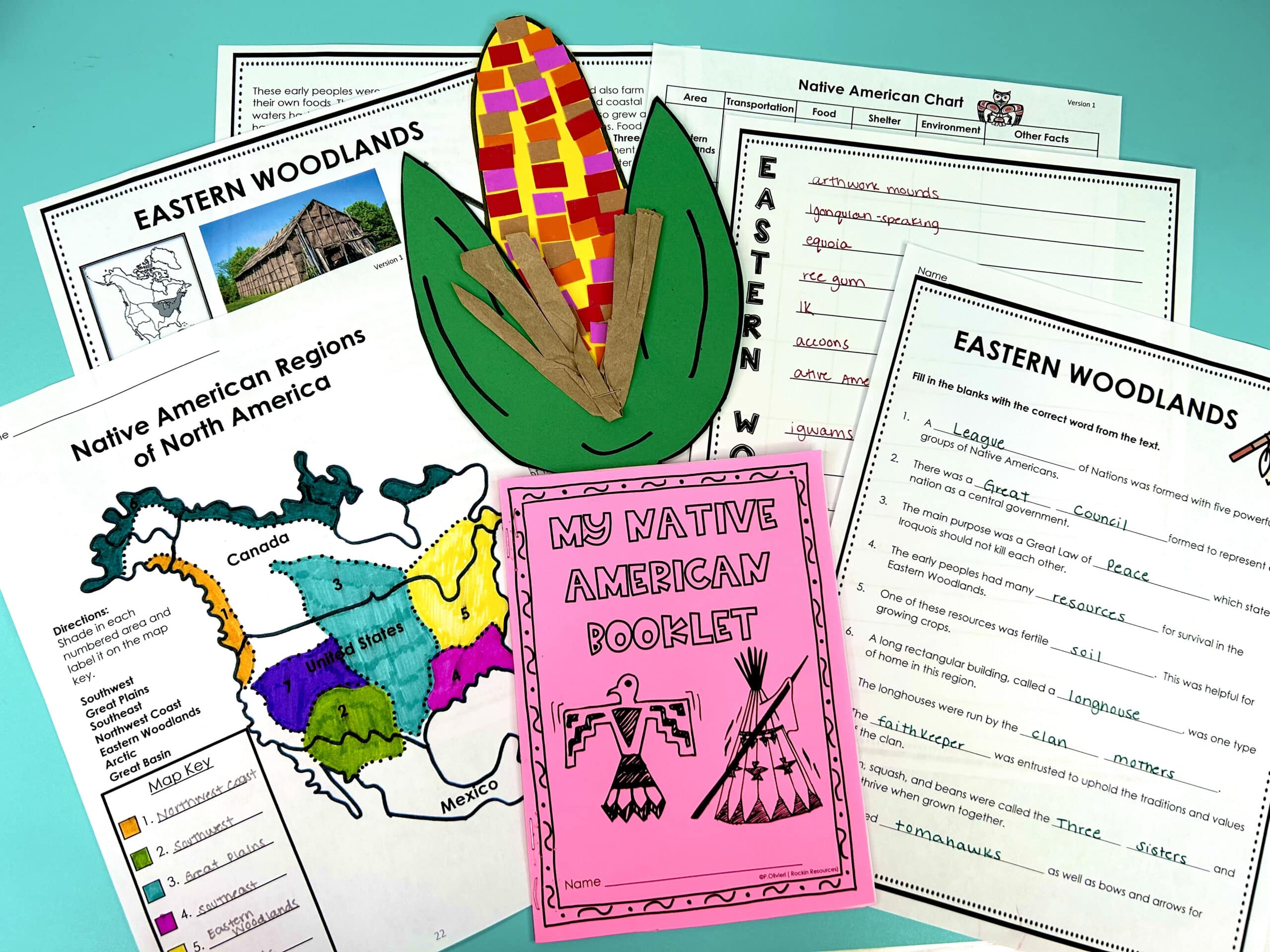
Informational Text and Comprehension Activities are included for the following regions:
- Eastern Woodlands
- Southeast
- Great Plains
- Southwest
- Northwest Coast
- Arctic
- Great Basin
🌟🌟🌟🌟🌟
“I used this as a homeschooling unit study. It was absolutely perfect. More than I expected especially for the price. This really took us through the Native American study in depth! Other studies I have done never went into this much organized detail. The rubrics and the worksheets for my kids were great. Thank you for this!” – Christina H., 2nd/3rd Grade Teacher
EXPLORERS UNIT
How did we get to America? Well, it took some EXPLORING! This Explorers Unit has its own informational text on eight explorers and has been divided into two units in chronological order to make the content easier for your students to learn! They will first learn about exploration terms and exploring the unknown. Then for each of the following explorers, students will map their routes, and learn about the reason for exploration along with what they discovered along the way. Students are given a variety of reading strategy questions to show their understanding of the text. The explorers are divided up into two units to make it more accessible for your students. There are foldables and quizzes included as well as a timeline project!
Informational Text and Comprehension Activities are included for:
- Exploring the Unknown
- Leif Erikson
- Christopher Columbus
- Amerigo Vespucci
- John Cabot
- Ferdinand Magellan
- Hernando DeSoto
- Henry Hudson
- Robert LaSalle
🌟🌟🌟🌟🌟
“My kids and I loved it! I even learned a lot! I highly recommend this purchase. I had the kids have their maps out during the lessons and would have them put their finger on where they started and ended up. This helped them better visualize the trips. We also reviewed the vocabulary and questions each day.” – Jennifer S., 4th Grade Teacher
COLONIAL UNIT
Once Europeans settled on American soil, how did they claim land? What was it like? The answers are in this comprehensive colonial unit that includes all the informational text needed to teach colonization in your classroom. There are graphic organizers, maps, comprehension questions, cause and effect activities, vocabulary, as well as craft and food ideas.
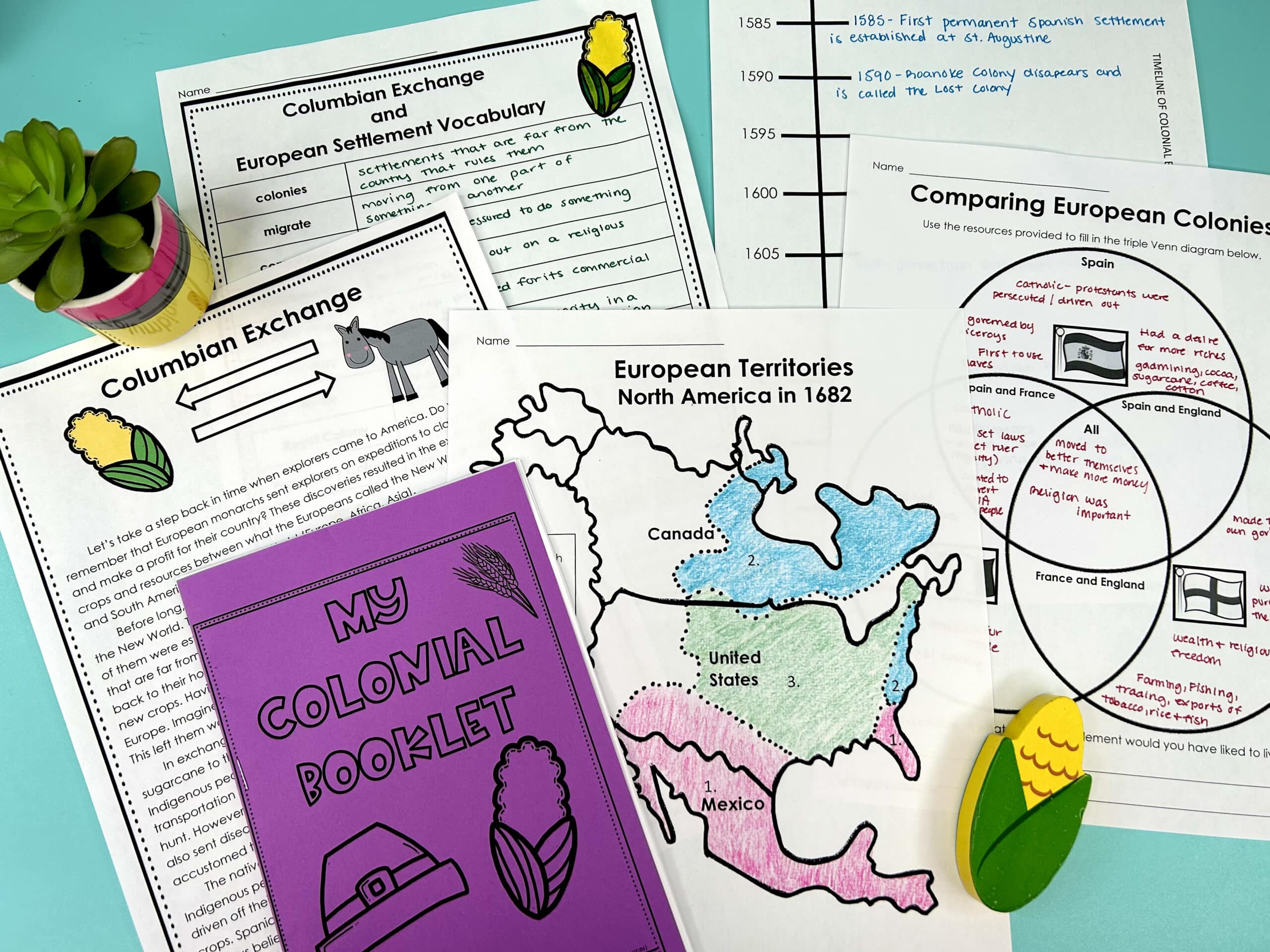
Informational Text and Comprehension Activities are included for:
- Columbian Exchange
- European Settlements and Territories in the New World (Spain, France, England)
- 13 Original Colonies
- Southern Colonies
- Middle Colonies
- New England Colonies
- Lost Colony
- Jamestown
- Plymouth
- The Triangular Trade Route
🌟🌟🌟🌟🌟
“This is the best resource!!! Everything you need is in this set. It has so many fun and engaging activities. Love that you added a digital component to your resource. It was perfect to use when my students were remote.” – Jackie E., 5th Grade Teacher
AMERICAN REVOLUTION BUNDLE
America gained its independence from the Crown when it defeated the British in the American Revolutionary War. It was the beginning of the United States of America! This is a wowzer of a unit. It combines the units of causes, battles/events, and important people all into one in chronological order. There is a variety of reading comprehension, poetry, timeline, and writing activities that go along with the articles to help students understand the era at a deeper level.
Informational Text and Comprehension Activities are provided for:
The Causes:
- French and Indian War
- Benjamin Franklin
- Proclamation of 1763
- Acts (Quartering, Stamp, Townshend, Tea, Intolerable)
- No Taxation Without Representation
- Boston Massacre
- Boston Tea Party
- King George
- First Continental Congress
- Patrick Henry
Battles and Events:
- Lexington and Concord
- Second Continental Congress
- Battle of Ticonderoga
- Battle of Bunker Hill
- Olive Branch Petition
- Battle of Quebec
- Common Sense
- Declaration of Independence
- Battle of Trenton
- Battle of Saratoga
- Battle of Valley Forge
- Battle of Rhode Island
- Bonhomme Richard
- Battle of Charleston
- Kings Mountain
- Battle of Cowpens
- Battle of Yorktown
- Treaty of Paris
Important People
- Benjamin Franklin
- King George III
- Patrick Henry
- Paul Revere
- John Hancock
- Thomas Jefferson
- George Washington
- Molly Pitcher
- John and Abigail Adams
- Marquis de LaFayette
- Crispus Attucks
- Peter Salem
- Phyllis Wheatly
- Mercy Otis Warren
- Benedict Arnold
- James Armistead
- Sybil Ludington
- Deborah Samson
- Nathan Hale
- John Paul Jones
- Thomas Paine
- General Cornwallis
- Ethan Allen
- Nathaneal Greene
- Samuel Adams
- Thomas Gage
- Francis Marion
- Bernardo de Galvez
- Alexander Hamilton
- Richard Henry Lee
🌟🌟🌟🌟🌟
“I absolutely LOVE this resource! My co-operating teacher used this resource during my student teaching, and I loved it so much I knew I had to get it for my own classroom as well. It is very engaging and the students learned so much!! I highly recommend this resource!” – Haley M., 4th Grade Teacher
GOVERNMENT UNIT
Government is very important to teach. Everything you need to successfully teach government in your classroom is included in this comprehensive Government Unit. It includes informational text in chronological order along with a variety of comprehension activities (including compare and contrast), charts, foldables, a class constitution, a collage activity, a timeline, graphic organizer, and assessments!
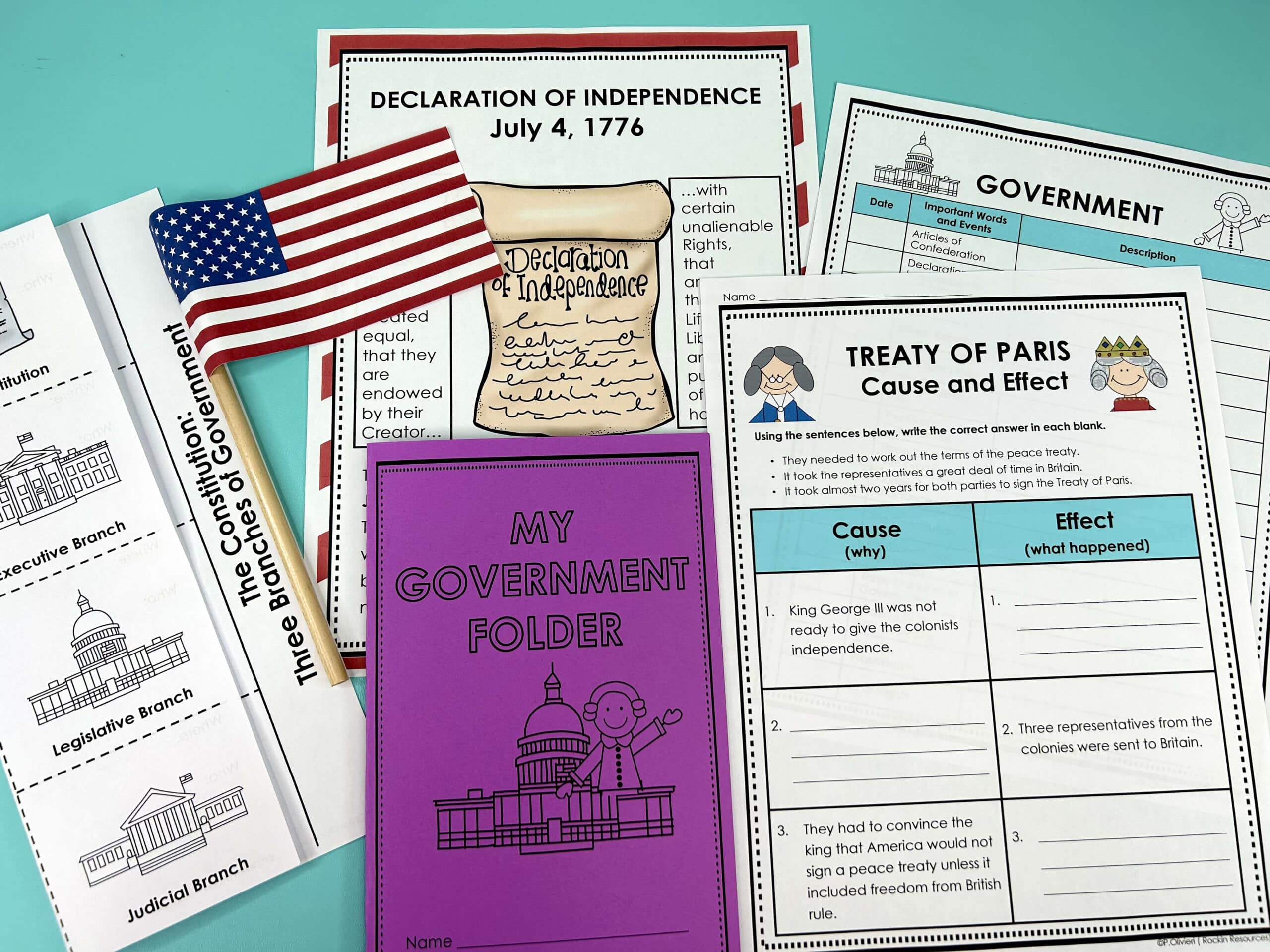
Informational Text and Comprehension Activities are included for:
- Articles of Confederation
- Declaration of Independence
- Treaty of Paris
- Shays’ Rebellion
- The Virginia Plan
- The New Jersey Plan
- The Great Compromise
- Three-Fifths Compromise
- Northwest Ordinance of 1787
- The Constitution
- Preamble
- Three Branches of Government
- Federalists
- Antifederalists
- George Washington
- Bill of Rights
🌟🌟🌟🌟🌟
“This resource is so very good! Each kiddo had their very own booklet and was able to make notes, highlight, etc. as they pleased. It’s a good foundation to begin building more knowledge about our government. The passages weren’t too easy or too hard, so everyone was able to participate without any hesitation. Thank you!” – Elizabeth G., 5th Grade Teacher
WESTWARD EXPANSION
Moving westward played a huge part in the America we know today! But how did it happen? And what did people have to go through to get there? There’s a lot to cover, but I broke it all down for you in this Westward Expansion Unit! It’s loaded with informational text and activities for events, battles and important people. There are charts, primary sources, maps, graphic organizers, foldables, projects, timeline, and so much more! Students will learn to infer, use text evidence, look closer at images, identify cause and effect, compare and contrast, group facts, use context clues, show chronological order, etc.
Informational Text and Comprehension Activities are included for:
- Daniel Boone
- Northwest Ordinance
- Louisiana Purchase
- Lewis and Clark
- Thomas Jefferson
- Sacagawea
- Seminole Wars
- Acquisition of Florida
- Santa Fe Trail
- Indian Removal Act
- Battle of the Alamo
- Trail of Tears
- Oregon Trail
- Manifest Destiny
- California Trail
- Annexation of Texas
- Mormons
- Mormon Trail
- Oregon Treaty
- Oregon Fever
- Mexican Cession
- Gold Rush
- Gadsden Purchase
- Pony Express
- Telegraph
- Pacific Railroad Act
🌟🌟🌟🌟🌟
“I love all the products from Rockin’ Resources! They never disappoint. This unit expanded the chapters that involved A New Nation and Westward Expansion. It was very easy to get my students involved in research and participate in all of the activities within the packet.” – Lacinda B., 6th Grade Teacher
CIVIL WAR UNIT
The Civil War played a key part in what America is today! Abraham Lincoln once said, “America will not be destroyed from the outside. If we falter and lose our freedom, it will be because we destroyed ourselves.” This Civil War unit includes well-crafted informational text in chronological order, along with creative lessons, activities, timeline, charts, maps, graphic organizers, projects, and a ton of reading comprehensions skills perfect for social studies. (Point of View, Summarizing, Cause and Effect, Comparison, Text Evidence, Vocabulary, etc.)
Informational Text and Comprehension Activities are included for:
- Causes of the Civil War
- Civil War North and South Advantages
- Civil War Border States Map
- Harriet Tubman and Other Abolitionists
- Civil War Loyalty Comparison
- African Americans in the Civil War
- Women in the Civil War
- Battle of Fort Sumter
- First Battle of Bull Run
- Battle of Ironclads
- Battle of Shiloh
- Second Battle of Fort Sumter
- Battle of Antietam
- Battle of Fredericksburg
- Emancipation Proclamation
- Battle of Chancellorsville
- Battle of Gettysburg
- Battle of Vicksburg
- Battle of Chickamauga
- Battle of Chattanooga
- Gettysburg Address
- Battle of Cold Harbor
- Sherman’s March to the Sea
- Appomattox Court House
- Thirteenth Amendment
- Lincoln Gets Shot
- Reconstruction
🌟🌟🌟🌟🌟
“This resource is wonderfully formatted and paced. My class loved learning about everything in chunks each day, so it wasn’t overwhelming or isolated. Great graphic organizers to have students process what they have learned.” – Ashley K., 5th Grade Teacher
RECONSTRUCTION UNIT
From the Emancipation Proclamation and Lincoln’s assassination to the Civil Rights Act and Rutherford B. Hayes Inauguration, the Reconstruction Era played a huge role in the progress of America. A lot happened in that vital time, so there’s a lot to uncover. No worries though, this Reconstruction Unit is loaded with informational text, reading comprehension activities (covering a ton of reading skills), a timeline, a cumulative project, primary sources, first- and second-hand accounts, and so much more!
Informational Text and Comprehension Activities are included for:
- Emancipation Proclamation
- Lincoln Re-elected
- Freedmen’s Bureau
- Robert E. Lee Surrenders
- Lincoln Assassination
- 13th Amendment
- Black Codes
- Civil Rights Act
- Memphis Race Riots
- New Orleans Race Riots
- Ku Klux Klan
- Reconstruction Acts
- President Johnson’s Impeachment
- 14th Amendment
- Ulysses S. Grant Election
- First Redeemer Government
- First African American Senator
- 15th Amendment
- 42nd Congress
- Freedmen’s Bureau Abolished
- First African American Governor
- Democrats Control
- Civil Rights Act Enacted
- Presidential Election Dispute
- Wade Hampton
- Rutherford B. Hayes Inauguration
- Reconstruction Ends
🌟🌟🌟🌟🌟
“I love all your Social Studies resources! Our new state standards picked up the Reconstruction period this year, but our textbooks end with the Civil War. This resource has been wonderful. I love that the passages are full of great information as well as containing relevant images. The level of questioning is varied as well to offer deep thinking.” – Whitney C., 4th Grade Teacher
INDUSTRIAL REVOLUTION
America, and the world, saw a fundamental change during the Industrial Revolution. This is when mass production, the rise of digital technology and more began! It completely changed society. With so many changes in such a short period of time, there’s a lot to cover in this unit. I broke it down chronologically for you. With this comprehensive Industrial Revolution unit, you’ll get well-crafted informational text with a variety of different comprehension questions to cover many reading skills, a timeline, study guide and test, as well as an end of unit project!
Informational Text and Comprehension Activities are included for:
- Thomas Newcomen’s first steam engine
- James Hargreave’s Spinning Jenny
- James Watt’s new design for a steam engine
- James Fitch’s steam engine design
- Samuel Slater’s first cotton mill
- Eli Whitney’s cotton gin
- Richard Trevithick’s steam-powered locomotive
- Robert Fulton’s steamboat and commercial steamboat company
- Government roads
- George Stephenson’s steam locomotive
- The Erie Canal
- First public railway
- Peter Cooper’s Tom Thumb steam engine
- First commercial steam engine
- Cyrus McCormick’s mechanical reaper
- John Deere’s steel plow
- Joseph Dart and Robert Dunbar’s grain elevator
- Charles Goodyears’ rubber
- Samuel Morse’s telegraph
- Elisha Howe’s sewing machine
- Elisha Otis’s safety brake for elevators
- Henry Bessemer’s steel production
- Transcontinental Railroad
- The National Labor Union
- The Knights of Labor
- George Brayton’s first combustion engine
- Joseph Glidden’s barbed wire
- Alexander Graham Bell’s telephone
- Thomas Edison’s incandescent lightbulb
- George Eastman’s camera
- Gottlieb Daimler and Karl Benz’s modern-style cars
- The American Federation of Labor
- Guglielmo Marconi’s machine to transmit radio waves
- Wilbur and Orville Wright’s airplane
- The National Child Labor Committee
- Reginald Fessenden’s broadcast music and entertainment over the radio
- Benjamin Holt’s gasoline-powered tractor
- Henry Ford’s Model T on the assembly line
- The end of the Industrial Revolution
🌟🌟🌟🌟🌟
“This unit was laid out so clearly, such a smooth process for instruction. The book recommendations included in this resource were excellent, kids have been trying activities outside of this unit. Highly recommend, opened the door for lots of further discussion and exploration. We were also able to connect some of the events to what is happening in our world today.” – Maureen K L., 6th Grade Teacher
WORLD WAR I
Informational Text and Comprehension Activities are included for:
- Causes of World War I
- The Assassination of Archduke Franz Ferdinand
- The Great War Begins
- Germany Invades Belgium
- First Battle of Marne
- Trench Warfare
- First Battle of Ypres Begins
- In Flanders Fields
- The Ottoman Empire Officially Entered the War
- Zeppelin Raids Begin in Great Britain
- Germany Declares Unrestricted Warfare
- The Second Battle of Ypres
- Anzac
- Sinking of Lusitania
- Italy Declares War and Enters World War I
- The Mesopotamian Campaign
- The Battle of Verdun
- The Battle of Somme
- Biography of Field Marshal Douglas Haig
- The Skyes-Picot Agreement
- The Battle of Jutland
- The Great Arab Revolt
- The United States Severs All Diplomatic Ties With Germany
- Zimmermann Telegram Received by America
- Woodrow Wilson
- America Declares War on Germany
- The Selective Service Act
- Women in World War I
- Animals in World War I
- The Lost Battalion and Cher Ami
- Sergeant Stubby
- The Espionage Act of 1917
- The Hello Girls
- Christmas Truce of 1914
- The Third Battle of Ypres (Passchendaele)
- General John Pershing
- The Battle of Cantigny
- The Assassination of Czar Nicholas II and His Family
- The Bolsheviks
- Vladimir Lenin
- Aisne-marne Offensive
- The Battle of Saint-Mihiel
- Treaty of Brest-litovsk
- The Battle of Vittorio Veneto
- Kaiser Wilhelm II
- Balfour Declaration
- Key Players in War and Peace
- Germany Signs The Armistice
- The Allied Occupation of Germany
- The Paris Peace Conference and the Treaty of Versailles
- The Creation of the League Of Nations
- Other Treaties That Ended World War I
- Prime Minister Herbert Asquith
- Prime Minister David Lloyd George
- French Prime Minister Georges Clemenceau
ALABAMA:
ARIZONA:
CALIFORNIA:
IDAHO:
INDIANA:
MISSOURI:
SOUTH CAROLINA:
TEXAS:
VIRGINIA:

